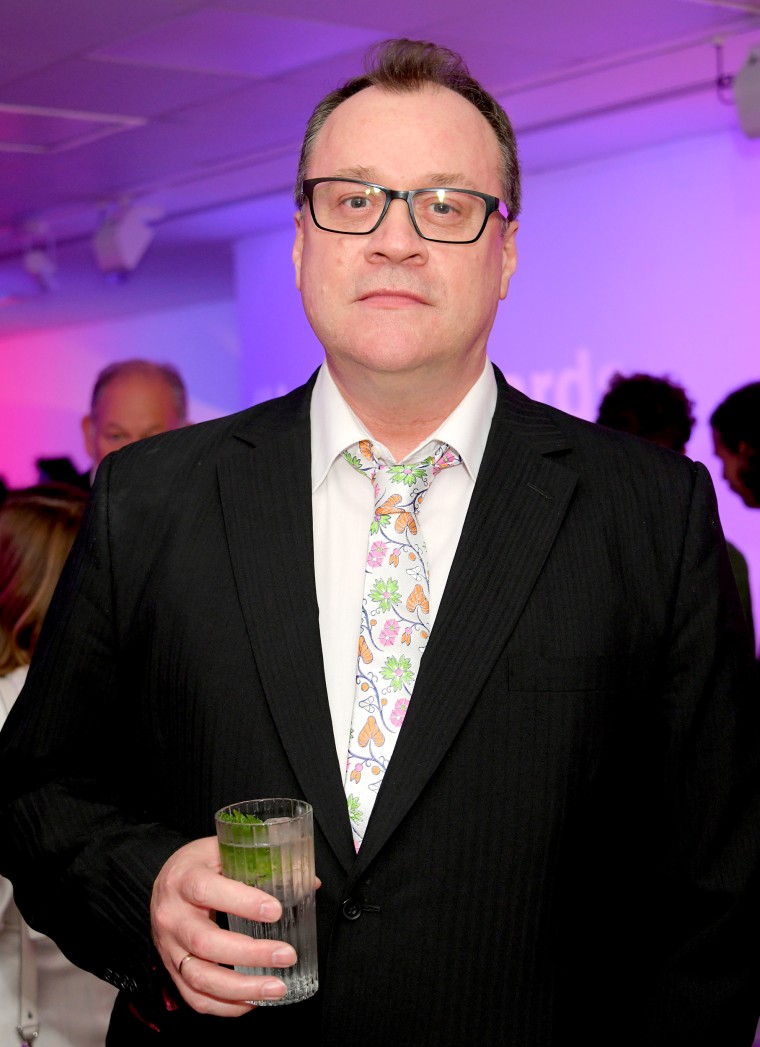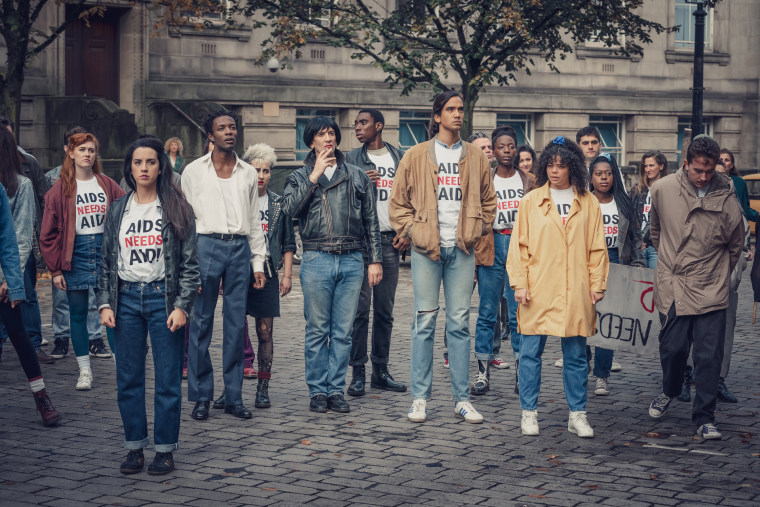After more than three decades of telling LGBTQ stories on British television, Russell T. Davies felt that it was time to revisit a particularly painful part of the past that also marked his coming of age: the early days of the AIDS epidemic.
The 57-year-old Welsh screenwriter — best known for creating the hit U.K. drama “Queer as Folk” and serving as the former showrunner of the “Doctor Who” reboot — had always wanted to use his own memories as a college student in Manchester to tell his version of the crisis. But it wasn’t until he realized that the memories of AIDS victims were dying with the aging elderly population, many of whom refused to acknowledge a virus that disproportionately killed gay men, that he decided to set his latest project in motion.
“A lot of those deaths were misreported, and the stories were mistold within families. People said that people died of liver cancer or pneumonia or all sorts of illnesses instead of AIDS,” Davies told NBC News. “But with the passing of the parents and the passing of a generation, those stories were calcifying, and I thought it was just time to open up those memories and re-examine the past.”

The result was the creation of a five-part miniseries titled “It’s a Sin,” which has broken viewing records in the U.K. and has now arrived in the U.S. on HBO Max. Set in 1980s Britain, the show follows a group of young gay men — Ritchie (Olly Alexander), Roscoe (Omari Douglas) and Colin (Callum Scott Howells) — who move to London and become roommates at a flat that they dub the Pink Palace. As they enjoy the freedoms of living away from home for the first time, a mysterious illness begins to kill gay men in unprecedented numbers and forever changes the trajectories of all of their lives.
While Davies acknowledged that it is difficult to get any major network to greenlight a new series, he said he knew that the premise of his show would be a particularly “hard sell” for television executives and viewers alike.
“There wasn’t a homophobic resistance; there wasn’t any doubt that HIV and AIDS is a strong subject. People actually felt like they’d already seen it,” he said. “We get a lot of American stuff — ‘The Normal Heart,’ ‘Angels in America’ — so those great monoliths have hung over us as well, which contributed to that feeling of commissioners thinking that this was familiar territory. I literally sat there in meetings, saying, ‘No, you haven’t actually. Trust me: You haven’t seen this before.’ And I was right.”
After conceptualizing the project in early 2015 and facing multiple rejections over the course of the next three years, Davies was relieved to discover that his pitch had been approved by U.K.’s Channel 4, a public-service broadcast network that is known for telling stories about minority and marginalized communities. As he began to write, Davies said he began to unpack his own memories of friends from over the years and did an extensive amount of research with the help of “activists, professors, consultants and people living with HIV.”
Pain, joy and lingering uncertainty
In his research, Davies said he “discovered all sorts of fascinating things,” and he then incorporated all of these interesting and odd real-life incidents into the show. In episode 2, for example, a character goes to the hospital and receives a questionnaire that asks, “Have you ever had sex with animals?”
“I was staggered by that,” he said of the questionnaire. “If there’s anything odd or strange, anything that sounds weird in there, it’s absolutely true, like catching silicosis and how you couldn’t get a mortgage if you were a gay man.”
While he not only managed to convey the ugly — and at times, strange — truths of the AIDS epidemic, Davies was also particularly keen to highlight the joy and freedom that people tend to overlook when talking about that era.
“Those are the people that I remember. The boys we lost in the ’80s — they were beautiful, gorgeous, funny and wonderful,” he said. “I think sometimes their memories get lost and silenced, because their deaths were so terrible, so cruel, so random, so strange, and still filled with stigma and the notion of shame. I thought it was my job to shine a light and say, ‘Actually, these people had enormous fun. They were full of joy and those lives were valid and wonderful.’ It was an honor to do that.”
But as the show progresses, the dark cloud of the crisis begins to loom larger and larger over London. Viewers witness the deaths of four characters in five episodes — which are spread out over a decade — with the fates of multiple characters still hanging in the balance by the end of the series. This lingering uncertainty, according to Davies, stemmed from his own inability to ascertain the fates of some of his own friends — many of whom went home amid the epidemic and never returned.
“There’s a couple friends of mine that I still argue about as to what their [cause of] death was. We can’t go to the families and insist on answers; they have every right to say whatever they want,” he said. “But the nice thing that’s happened is that everything that happens [in the show] is based on true stories about people or friends that I knew.”
Davies revealed that many of the stories in the series were based on his friend Derek, whose name he avoided using in the show, because Derek’s parents had not disclosed how their son died. However, after the show aired in the U.K., Davies said he received an unexpected call from Derek’s family.
“It turned out his parents had passed away. His brother got in touch and said, ‘Oh my God, I’ve had to lie about this for 30 years. I’m delighted and proud to say that he died of AIDS. I’m proud of him.’ He actually used the word proud, and his children are proud,” Davies recalled. “That moved the entire production team and made us really aware of the responsibility that we had.”
While the stigma of HIV and AIDS leaves many of the show’s characters feeling isolated and alienated, there is one constant at the bedside of the characters who have fallen ill: a straight woman named Jill (Lydia West), who carries much of the emotional burden of the disease and illustrates the importance of active allyship during that time. Davies revealed that Jill is loosely based on his longtime friend Jill Nalder, who actually plays the character’s on-screen mother.
“Us queers and our allies go hand in hand throughout history. I’ve written a million gay stories, and they’ve always been there, because they’re an essential part of our lives,” Davies said. “I think it becomes even more important in this story because it was those allies — those women, those lesbians and those straight men as well — who did a marvelous job of being at those bedsides and fighting for money, medicine and research.”
Prioritizing gay actors
Since the show first aired in the U.K. in late January, Davies has been an outspoken advocate for casting only queer actors in queer roles, which has added fuel to a complicated debate about which actors should be allowed to play which roles. In “It’s a Sin,” he cast every gay role with a gay actor, including Neil Patrick Harris and Stephen Fry who have supporting roles.
“I do like the fact that it upsets people so much, because I have no authority,” Davies said with a laugh. “It’s not a policy; it’s not a rule. Everybody can do what ... they like on whatever shows that they do. I know that I have just made one using my rules, and it worked sensationally. No one can point at my show and say, ‘You could have cast that better.’”
“I do love it when straight commentators give this two-seconds thought when I’ve been working in this field for 35 years,” he added. “I guarantee that I’ve given it more thought than anyone, and I have these massive ranks of unemployed and unseen out gay actors — who are not seen or recommended for parts, who are not even spoken about in the casting room — and that’s who I’m delighted to represent.”
One thing that can’t be debated is the unprecedented success of “It’s a Sin,” which became the most binge-watched show on All 4, Channel 4’s online streaming service. Davies acknowledged that his portrayal of the HIV/AIDS epidemic will be far from the last, but he said he is extremely “glad to have contributed to a great and enormous body of work.”
“There’s ‘Holding the Man,’ ‘The Inheritance,’ ‘Pride,’ — there’s a million things that I’m not naming, but I’m probably aware of them all,” he said. “If you put together this quilt that is the story of the AIDS epidemic, if we all keep contributing panels to this, there will be a near complete representation of all the stories based on HIV/AIDS, and I’m really, really proud to be a panel in that big quilt.”
All five episodes of “It’s a Sin” are now available to stream on HBO Max.


